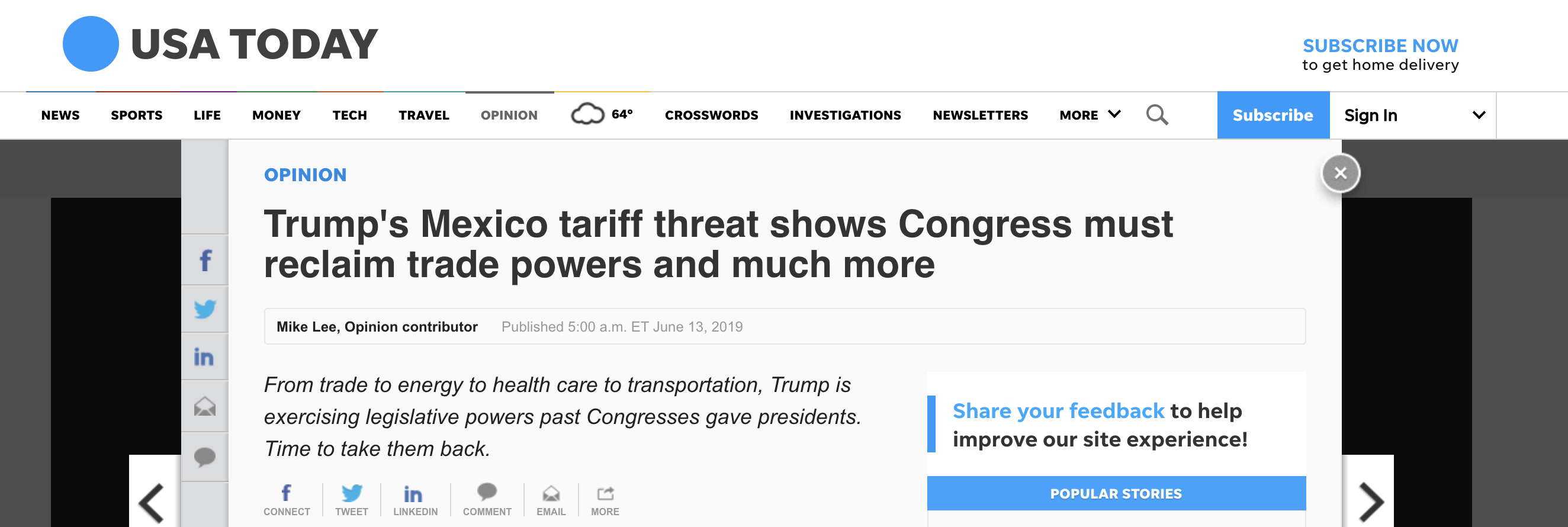Sen. Lee Introduces Protecting Access to American Products Act
Jun 13, 2019
WASHINGTON – Sen. Mike Lee (R-UT) introduced the Protecting Access to American Products Act Thursday, a bill that makes it easier for Americans to receive flexibility from Jones Act regulations that prevent Americans from buying American.
“American consumers should not be forced to buy more expensive products from despotic regimes just because of outdated and misguided government regulations,” Sen. Lee said. “All Americans should be free to trade with other Americans and the Protecting Access to American Products Act will help ensure that happens.”
Trump's Mexico tariff threat shows Congress must reclaim trade powers and much more
Jun 13, 2019

It’s not every day that a topic near and dear to my heart — the separation of powers — becomes front-page news, but that’s exactly what happened this past week as thousands of manufacturers, farmers, retailers, builders, and restaurateurs realized that President Donald Trump was absolutely serious about implementing a 5% tariff on all Mexican imports on June 10.
June 12, 2019 - Mobile Office Visit to Sevier County
Jun 12, 2019
What: Mobile Office Visit to Central Valley
When: Wednesday, June 12, 2019 @ 8:30 – 9:30 am
Where: 50 W Center Street, Central Valley, UT 84754
Senator Lee's Opening Remarks for Antitrust, Competition Policy, and Consumer Rights Hearing
Jun 12, 2019
Welcome to this hearing of the Subcommittee on Antitrust, Competition Policy, and Consumer Rights.
Today we are pleased to have with us four distinguished witnesses to testify about vertical consolidation in the healthcare industry. We appreciate you taking the time to be with us today.
June 12, 2019 – Mobile Office Visit to Sevier County
Jun 12, 2019
What: Mobile Office Visit to Richfield
When: Wednesday, June 12, 2019 @ 9:45 am – 11:15 am
Where: 250 N Main Street, Richfield, UT 84701
Sen. Lee Introduces Miracle Mountain Designation Act
Jun 11, 2019
WASHINGTON – Sen. Mike Lee (R-UT) introduced the Miracle Mountain Designation Act Monday, a bill that celebrates the survival of Elk Ridge City, Utah during the Bald Mountain Fire.
Making Housing Work for Utah Families
Jun 7, 2019
There are many pressing issues today that deserve our attention – so many, in fact, that it can sometimes be difficult to keep them straight.
But there is one issue – one challenge facing the American people today – that rises above the rest. That issue is the family, and I believe that its break down may be the single defining challenge of our time.
Take Care Act
Jun 7, 2019
Before he was elected, President Trump was famous for the catch-phrase “you’re fired,” which he popularized on his reality T.V. show “The Apprentice.” And it’s no surprise that it would have so much appeal for a television audience.
It carries a certain power and resonance because the person who has the authority to use it within an organization is, generally speaking, the person who gets to call the shots. It is emblematic of executive control and the ability to get things done. It is the ultimate and essential backstop that enforces and reifies an executive’s power to make decisions.
Sens. Lee and Hawley Introduce the Take Care Act
Jun 5, 2019
WASHINGTON – Sens. Mike Lee (R-UT) and Josh Hawley (R-MO) introduced the Take Care Act Wednesday, a bill designed to promote accountability and effective administration by restoring the original understanding of the President’s constitutional power to remove his subordinates.
“For nearly 150 years after the Founding, it was well-established that Article II of the Constitution gave the President complete power to remove upper-level executive branch officers,” Sen Lee said. “But following the Supreme Court’s deeply flawed decision in Humphrey’s Executor, Congress has, since the New Deal era, gradually created an immense, headless fourth branch of government that is outside the President’s control and thus totally unaccountable to the American People. It’s time for a course correction.”
Take Care Act Floor Remarks
Jun 5, 2019
Mr./Madam President:
President Trump was famous for many things even before he was elected. One of those things was the catch-phrase “you’re fired,” which he popularized on his reality T.V. show, “The Apprentice.” This is a relatively commonplace phrase, but it’s not surprising that it would have so much appeal for a television audience.
